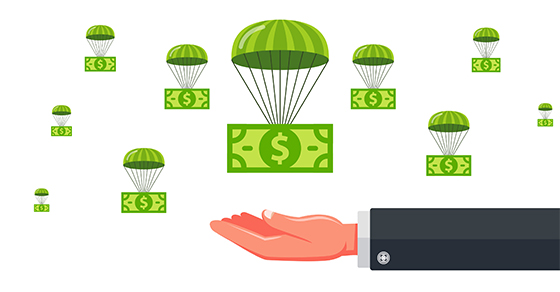
As you may have heard, the Coronavirus Aid, Relief and Economic Security (CARES) Act allows “qualified” people to take certain “coronavirus-related distributions” from their retirement plans without paying tax.
So how do you qualify? In other words, what’s a coronavirus-related distribution?
Early distribution basics
In general, if you withdraw money from an IRA or eligible retirement plan before you reach age 59½, you must pay a 10% early withdrawal tax. This is in addition to any tax you may owe on the income from the withdrawal. There are several exceptions to the general rule. For example, you don’t owe the additional 10% tax if you become totally and permanently disabled or if you use the money to pay qualified higher education costs or medical expenses
New exception
Under the CARES Act, you can take up to $100,000 in coronavirus-related distributions made from an eligible retirement plan between January 1 and December 30, 2020. These coronavirus-related distributions aren’t subject to the 10% additional tax that otherwise generally applies to distributions made before you reach age 59½.
What’s more, a coronavirus-related distribution can be included in income in installments over a three-year period, and you have three years to repay it to an IRA or plan. If you re-contribute the distribution back into your IRA or plan within three years of the withdrawal date, you can treat the withdrawal and later re-contribution as a totally tax-free rollover.
In new guidance (Notice 2020-50) the IRS explains who qualifies to take a coronavirus-related distribution. A qualified individual is someone who:
- Is diagnosed (or whose spouse or dependent is diagnosed) with COVID-19 after taking a test approved by the Centers for Disease Control and Prevention (including a test authorized under the Federal Food, Drug, and Cosmetic Act); or
- Experiences adverse financial consequences as a result of certain events. To qualify under this test, the individual (or his or her spouse or member of his or her household sharing his or her principal residence) must:
- Be quarantined, be furloughed or laid off, or have work hours reduced due to COVID-19;
- Be unable to work due to a lack of childcare because of COVID-19;
- Experience a business that he or she owns or operates due to COVID-19 close or have reduced hours;
- Have pay or self-employment income reduced because of COVID-19; or
- Have a job offer rescinded or start date for a job delayed due to COVID-19.
Favorable rules
As you can see, the rules allow many people — but not everyone — to take retirement plan distributions under the new exception. If you decide to take advantage of it, be sure to keep good records to show that you qualify. Be careful: You’ll be taxed on the coronavirus-related distribution amount that you don’t recontribute within the three-year window. But you won’t have to worry about owing the 10% early withdrawal penalty if you’re under 59½. Other rules and restrictions apply. Contact us if you have questions or need assistance.
